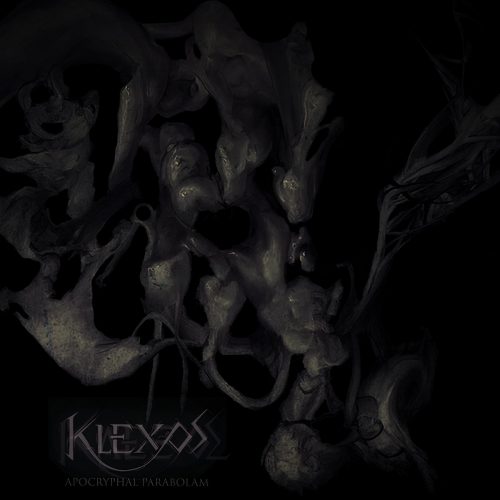
(Andy Synn takes time out of his busy schedule to catch up with an album he’s been dying to write about for some time, namely the debut album from Disso-Tech upstarts Klexos)
So here’s the thing… originality is overrated.
Don’t get me wrong, when something does come along which truly moves the needle, shifts the paradigm, or [insert zeitgeist-y term here], I’m usually right up there with everyone else, marvelling at how brilliant it is and wondering how no-one thought to do… whatever it is… before.
But originality isn’t, or shouldn’t be, everything – being original doesn’t necessarily make you good, for one thing – and the way it’s often fetishised has led me to encounter some very odd people/statements online over the years (for example, did you know that since Gorguts exist that any band who plays in 4/4 or uses standard song structures no longer counts as “real” Death Metal?).
Let’s face it, we’re all, ultimately, the sum of our experiences, our influences, and our environment. This is especially the case if you’re a musician, because who you are as an artist is largely shaped by the music which inspires you. Not just in the way it colours and dictates your listening preferences, but in how it actively alters how you listen to and understand – and, in turn, create – music.
Which I suppose is a long-winded way of getting to the point and saying that while Apocryphal Parabolam, the debut album from Lexington, Kentucky’s Klexos may not be a wholly original affair, that doesn’t mean it doesn’t still have a certain spark of something – call it inspiration, call it individuality – which makes it well worth listening to.
From a purely nuts-and-bolts perspective this extremely talented two-piece (Evan Neiman on drums, Brandon Brown on everything else) could be said to sit rather neatly somewhere between the devastating Disso-Death delivery of Ulcerate and the more abstract Atmo-Tech approach of Fallujah.
It’s a heady, heavy, and at times unexpectedly haunting, blend of sounds and styles, and one the duo have clearly put a lot of thought and care into, both in terms of each track’s composition and the overall execution of the album, which is never less than top-notch.
What’s really interesting about Apocryphal Parabolam, however, is the way that you can actually trace the album’s architecture and practically visualise its arc over time as it moves from one of these two extremes to the other, with different songs sitting at different points along the spectrum along the way.
The opening pairing of “Obfuscâre Veritas” and “Beyond the Wall of Sleep”, for example, err closer to the Ulcerate end of the scale in all their discordant density and oppressive, bone ‘n’ gristle atmosphere and are (with the assistance of some nasty, nail-gun riffage which suggests the band have more than a bit of Soreption in their DNA) amongst the strongest songs on the record.
As the album progresses you’ll find that the band begin to inject an ever-increasing dose of eerie melodic ambience as a counterpoint to their twisted technical dissonance, beginning with the unexpectedly beguiling and bombastic strains of “Cosmogeny”, before tipping over much more fully towards the Fallujah-esque side of things for the mid-album pairing of “Adiaphora” and “Sapêre Obscured”.
And while, from my perspective, these songs represent the album’s low point, and the one where they sound least like themselves (both tracks largely lacking the more organic, synesthetic sensibilities which defined the earlier material) that’s not to say that they’re bad songs in any way, they just feel a little divorced, in tone and style, from what came before… and what comes after.
Thankfully the album’s parabolic curve then swings back towards the more dissonance-driven end of the scale (without totally sacrificing the more introspectively melodic elements of the band’s sound) with “Oneiroi”, before reaching what feels/looks/sounds like its apex during “Astathmêta”, which is both the album’s longest song and easily its best, seamlessly synthesising both the dark and the light sides of the group’s identity to create something which, if not wholly original is certainly distinctive.
Concluding with the notably Soreption-esque title-track, the overriding impression you’re likely to be left with upon finishing Apocryphal Parabolam is of an album that isn’t so much uneven as it is slightly uncertain with regards to what (or who) it wants to be, from a band who haven’t quite, as things stand right now, locked onto that key thread which will allow them to weave all their influences, ideas, and inspirations together into a truly cohesive whole.
That being said, for all its minor flaws and failings, this is definitely one of my favourite albums of the year so far, from a band absolutely overflowing with promise and potential, and who I sincerely hope are only going to go on to achieve even bigger and better things in the future.

Never knew how awesome a combination of Fallujah (mostly) and Ulcerate would be. The dissonance is way more melodic and less overwhelming than with Ulcerate, which makes it just right. This is a great album.
(That last Ulcerate album was a shock for me. It sounded just like all other Ulcerate albums, but I realized I didnt like them as much anymore, sad to say. Every song just seems like meandering dissonance with no other songwriting goal).